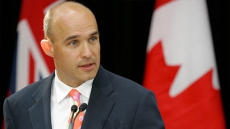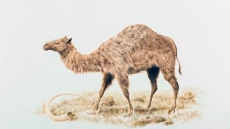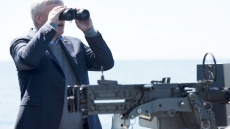TORONTO — South Korea's burgeoning MERS outbreak should be a reminder to the world that a virus some may have written off can trigger significant disease and major disruption, a World Health Organization expert says.
The outbreak in that country has now infected 126 people, 11 of whom have died. And it may be a while yet before South Korea's health officials manage to stop spread of the virus, said Peter Ben Embarek, the WHO's point person for Middle East respiratory syndrome or MERS.
Two hospitals have been closed, several thousand people have been ordered into quarantine and tourists are reportedly cancelling trips to the country.
The unexpected outbreak and the reaction to it is highly reminiscent of the 2003 SARS outbreak, also caused by a coronavirus. And the WHO is hoping countries that may have grown complacent about MERS are taking note.
"It should be a wake-up call for all those who didn't believe MERS could move seriously outside of the Middle East," said Ben Embarek of the virus, which has until now has done most of its damage on the Arabian Peninsula.
The outbreak should inspire countries to boost their efforts to spot imported cases, such as the one that touched off the South Korean outbreak, as well as prepare for what they would do if a MERS patient arrived in their health-care systems, he suggested.
"I think the first lesson from the Korea event, whatever happens there, is that the source (of MERS) is still in the Middle East and the same source could create similar events in any other countries in the world tomorrow or the day after tomorrow."
In South Korea, a businessman who travelled to four Middle East countries got sick after his return in early May. He sought care at four health facilities before he was diagnosed with the disease. In the 10 days between the onset of his illness and his diagnosis and isolation, he infected more than two dozen people.
Investigations so far suggest aspects of Korean health-care created an ideal environment for the virus to spread.
Crowded emergency departments. A tradition of doctor shopping — it is not uncommon to seek more than one medical opinion. Shared hospital rooms with multiple beds. An expectation that family members will encamp to look after their loved ones.
For a virus that already seems to prefer spreading in hospital settings, these conditions appear to be ideal.
"There is something in hospital environments that seems to be more conducive for transmission than elsewhere," Ben Embarek admitted.
In the nearly three years since the MERS coronavirus was first discovered, it has infected more than 1,200 people and claimed at least 449 lives. The virus, believed to originate in bats, also infects dromedary camels. It is thought they are the source of human infections, though many cases in the Middle East report no contact with camels.
Nineteen countries have diagnosed cases. The lion's share of infections has occurred in Saudi Arabia, where hospital outbreaks have made up the majority of cases.
Ben Embarek noted that a large outbreak last spring in Jeddah probably involved between 150 and 200 patients.
It remains to be seen if the South Korean outbreak will overtake it in terms of sheer numbers. But given how many hospitals there have dealt with MERS cases — about three dozen — it will likely take time to stamp out all the embers of this outbreak.
"I would not be surprised if we continue to see the same picture with some peaks and some sporadic cases and some clusters of cases coming up in the coming couple of weeks," Ben Embarek said.
He expressed confidence, though, that stringent control measures that have come into effect in recent days will start to pay off.
One of the lessons from South Korea should be the importance of getting a full travel history from people who present for medical care with respiratory symptoms, Ben Embarek said, adding travel histories should be mandatory.
s
Still, he acknowledged it will be a challenge to have an entire medical system on alert for an infection most doctors may never see.
"It's not an easy one to deal with. But it should still be important for all countries not to forget MERS," he said.






